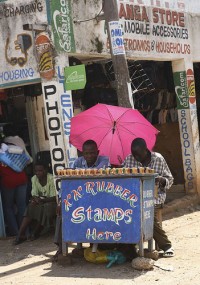The Impact of Change (the monetary kind)
Today's NYT imes draws attention to how Zimbabweans are spending so much time waiting around for change -- not change of the political nature this time, the NYTimes notes, but change--small money--for any simple purchase. From bus rides, small purchases of fruit or vegetables, or even a weekly supermarket trip, vendors just don't have change.
imes draws attention to how Zimbabweans are spending so much time waiting around for change -- not change of the political nature this time, the NYTimes notes, but change--small money--for any simple purchase. From bus rides, small purchases of fruit or vegetables, or even a weekly supermarket trip, vendors just don't have change.
But these days, Robson Madzumbara spends a lot of time quite literally waiting around for change. Pocket change, that is. He waits for it at supermarkets, on the bus, at the vegetable stall he runs and just about anywhere he buys or sells anything. “We never have enough change,” he said, manning the vegetable stall he has run for the past two decades. “Change is a big problem in Zimbabwe.”
The article highlights the relevance of IPA's most recently posted evaluation summary. The study, run by Lori Beaman, Jeremy Magruder, and Jonathan Robinson found that in Kenya the average firm loses an estimated 5 to 8 percent in profits from a combination of sales lost because of not having change and sales lost while searching for change.
Anyone who has ever tried to buy a piece of fruit or even a week's worth of fruits and vegetables in a market in the developing world with the bills that the local ATM spits out will understand this problem--no one ever has the right change.
The study further tested the impact of providing information to the firms about the impact of having change on hand. The estimates indicate that overall, changes in behavior from simply being reminded of the impact of having change on hand resulted in a 12 percent increase in profits. For the full evaluation summary, click here. To read the full academic paper, click here.
It seems from the NYTimes article that in Zimbabwe, people are well aware of the change problem, but imagine the impact this widespread lack of change must be having on Zimbabwe's shops! Now the question remains if Zimbabwe can overcome both its change problems.












